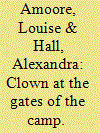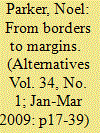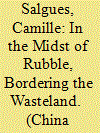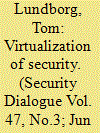|
|
|
Sort Order |
|
|
|
Items / Page
|
|
|
|
|
|
|
| Srl | Item |
| 1 |
ID:
119950


|
|
|
|
|
| Publication |
2013.
|
| Summary/Abstract |
This article considers the figure of the clown-fool as a way of approaching anew contemporary practices of sovereignty and resistance. The spectre of the camp as the nomos of modern sovereign power is widely critiqued for its neglect of the thriving and teeming life that actually accompanies the declaration of exception. The clown is an errant and troublesome figure whose life haunts the sovereign decision on exception. His presence in border-camp activism invokes a rich, provocative history in which the clown's foolish wisdom has critiqued the conceits of power. Yet, the clown's significance exceeds his traditional associations with carnivalesque misrule and mockery. Like homo sacer, the clown occupies an ambiguous position between political inclusion and exclusion, between inside and outside. In short, the sovereign needs the clown. His relation to resistance is thus also complex. The clown does not turn to face a locus of power as though it could be countered or overturned. Rather, he is the example par excellence of the resistance always already present within the exercise of power: standing not inside or outside the gates, but looking through, he dwells within the court but is not of its making. As a singularity akin to Deleuze's figurative children and Agamben's tricksters, the clown troubles the division between interior and exterior on which sovereign political life rests, a division that is also frequently replicated in understandings of resistance.
|
|
|
|
|
|
|
|
|
|
|
|
|
|
|
|
| 2 |
ID:
090163


|
|
|
|
|
| Publication |
2009.
|
| Summary/Abstract |
While concepts of a postinternational politics properly highlight the constant variance of entities in play in international relations, the approach lacks an ontology that shows how such an unstable variety of types of players can coexist in a common field in the first place. This article draws upon Deleuze's philosophy to set out an ontology in which the continual reformulation of entities in play in "postinternational" society can be grasped. This entails a strategic shift from speaking about the "borders" between sovereign states to referring instead to the "margins" between a plethora of entities that are ever open to modifications of identity. The concept of the margin possesses a much wider reach than borders, and focuses continual attention on the meetings and interactions between a range of indeterminate entities whose interactions may determine both themselves and the types of entity that are in play.
|
|
|
|
|
|
|
|
|
|
|
|
|
|
|
|
| 3 |
ID:
182941


|
|
|
|
|
| Summary/Abstract |
Drawing from two ethnographic studies of children, one in a former industrial neighbourhood in the process of demolition in Shanghai, and the other in a rural town in Guangdong, this article explores the relationships children form with the landscape of ruins as they wander about with the aim of identifying the opportunities these offer in terms of games, freedom, and sharing, etc. The article analyses two different dynamics in the types of ruins and the experiences associated with them: concentration and dispersion. The structural geography and qualitative demography that emerge from this are barely mentioned in Chinese public debate, in its categories (children of “migrant workers” or “left-behind” children), its problems, and its very negative representations, but whilst they underline the unequal divisions in society, they also reveal a richness of experience that is far from being necessarily unhappy.
|
|
|
|
|
|
|
|
|
|
|
|
|
|
|
|
| 4 |
ID:
145974


|
|
|
|
|
| Summary/Abstract |
During the last couple of decades, the virtual has emerged as a forceful conceptual tool in security studies. While used primarily in order to question assumptions about an objective truth concerning the meaning and value of security and different forms of insecurity, the implications of drawing on this concept vary considerably depending on how the virtual is conceptualized, and specifically how the potentiality of the virtual is linked to the process of actualization. Turning to the philosophies of Baudrillard, Agamben and Deleuze, as well as key thinkers in contemporary security studies, this article delineates three different approaches to analysing the virtualization of security. Focusing in particular on how these approaches point to contending views of ‘capture’ and ‘resistance’, it is argued that the choice of approach has serious implications for grasping what is at stake politically in the process of virtualization. These implications relate, more precisely, to how the virtual opens up and/or closes down the spaces of resistance that the modern subject of security traditionally has relied upon. In this way, the virtualization of security not only is important for thinking about capture and resistance, but challenges the very ground on which the modern subject of security rests.
|
|
|
|
|
|
|
|
|
|
|
|
|
|
|
|
|
|
|
|
|